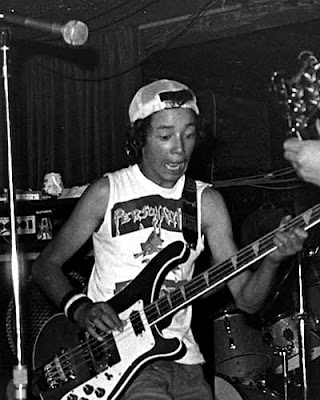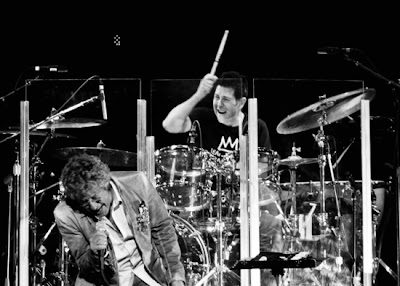Retro Reverb
AM & Shawn Lee Do Things the Old Fashioned Way, Then They Send It Across the Atlantic Digitally
AM & Shawn Lee play Soho in Santa Barbara Thursday, Sept. 26; the Glass House in Pomona Friday, Sept. 27; The Independent in San Francisco Sat., Sept. 28; and the Abbott Kinney Festival Sunday, Sept. 29. They’re also hitting San Diego, Phoenix, Austin, Dallas, Tulsa and Denver.
AM and Shawn Lee met because of their shared influences, Italian and French soundtrack composers from the 1960s who were fairly prolific through the 1980s, particularly Giorgio Moroder. This led to a lot of researcher on my part about Moroder, who is fairly fascinating, as well as Library Music, something I had never even heard of before but had definitely heard it. I just didn’t know what it was called.
The results of the union are sexed-up scene-stealers, reminiscent of the disco-era soundtracks by their idol Moroder for movies like Foxes, Flashdance, Midnight Express and sultry hits written for Donna Summer. (Moroder’s profile is becoming more mainstream thanks to a recent spoken word cameo on Daft Punk’s Random Access Memories called “Giorgio by Moroder.”)
It usually works out that Lee sends an instrumental track to AM, AM writes all the lyrics and then Lee and his engineer Pierre Duplan handle the mixing. “But Shawn and I both play a bunch of instruments, and we’re not really ego driven on who does what. It’s more like who does it first. It’s a nice balance.” They use unmodified vintage equipment, the kind that is picked up cheap because most people view it as clutter. “We use them as they are,” AM says. “I actually get annoyed when people ‘circuit bend’ old keyboards. No need to modify what already sounds great and has tons of character.” Lee has been making instrumental music this way for more than a decade. Recording under the moniker Shawn Lee’s Pink Pong Orchestra, he’s put out tracks that become infamous for hip-hop sampling. And his song “Kiss the Sky” was recently handpicked by George Clooney for his new film The Monuments Men, out December 2013. The movie also stars Bill Murray and Matt Damon, two of my favorite leading men, so count me in. “We definitely embrace the convenience of digital recording,” AM says. “After all we are trading files between LA and London.” But we use vintage analog and early digital technology a great deal. We almost always tend to get the sounds we want with that equipment going in. We don't rely on the computer so much for getting our sounds. It's more there for the convenience of trading files and slight editing. Check out the video for "Replay":
AM & Shawn Lee Transport You Back to the 20th Century
By Arrissia Owen
OC Weekly
Sept. 26, 2013
If AM & Shawn Lee's newest
release, La Musique
Numerique, transports you to a time when kitschy 1960s, '70s and
even early '80s movies with partying and humping as central themes ruled, then
consider it mission accomplished.
Their latest offering is an ode to the libidinous
hip-grinding music by Italian and French soundtrack composers such as Giorgio
Moroder, Ennio
Morricone, Stelvio
Cipriani, Sauveur
Mallia, Piero
Umiliani and more—godfathers to today's bands, including Air
and Daft Punk.
The bones of any AM & Shawn Lee song are period drum
machines and keyboards, the same vintage Moogs and consumer-model Casio and Yamaha rigs
that ruled when digital technology was just starting to woo the music industry.
The duo's synth-heavy disco and funkified electronic music is reminiscent of
those film scores, not to mention gobs of library music by even more obscure composers.
Song sorcerers in their own right, AM and Shawn Lee were
each successful solo musicians with parallel influences when their musical
worlds collided. The resulting collaboration takes over the Glass House in Pomona on Friday,
delivering hypnotic, slinky cosmo funk.
La Musique Numerique overflows with come-hither
infatuation on songs such as "All the Love," "In the
Aftermath" and "Replay," which are sure to plunge your mind
right into the gutter. Even songs about breaking up, addiction and a depressing
economy manage to sound racy.
AM & Shawn Lee record the way the composers they emulate
would have while exploring the simplicity and sounds of the retro equipment,
such as the Roland SDE 1000, an early-'80s digital delay unit. "The record
[is] a very big tip of the hat to the early digital age of recording
technology," AM says.
"The tone—people who know that equipment will hear it
in the record, this early turn-of-the-digital-century sound, before digital got
kind of cold and metallic-sounding," he continues. "Some musicians
seem to be simplifying their set-ups, relying heavily on the computer, but
analog and early digital technology had warmth and grittiness. You will
definitely hear that all over our recordings."
AM fans from his early years shouldn't be surprised by the
artist's interest in soundtracks. His songs have set scenes on TV shows
including Grey's
Anatomy, Keeping Up
With the Kardashians, Big Love and various Real World seasons.
Every track off his first album, 2005's Troubled Time, made it to the
small screen; the album also helped to earn him LA Weekly's
award for Best Singer/Songwriter.
While AM's early folk-rock garnered comparisons to Wilco, his
third studio recording, 2010's Future Sons and Daughters, featured
ethereal tunes pulled from disco, Brazilian Tropicália, psychedelic rock and
'70s funk. This emerging sound garnered him invitations to tour with French
luminaries Air and Charlotte
Gainsbourg.
Enter Shawn Lee, a Kansas-born ex-pat living in London. The
award-winning video-game composer and multi-instrumentalist's work has been
featured in movies, Oceans 13 and The Break-Up among them,
as well as various snowboarding videos. Under the moniker Shawn Lee's Ping Pong
Orchestra, he has become one of the most sampled artists in hip-hop
and is known for his innate ability to make everything from a kalimba and ektar
to a charango sing.
The two became friends in 2008. They bonded over shared
influences, and in 2010, AM sat in with Lee at an LA show. They started working
on their first recording, Celestial
Electric, and played their first show as a band at the 2011 South By
Southwest music festival. "It makes sense that someone like me, being a
freak about that kind of music, would reach out to him and create a bond,"
AM says, adding that Lee has been producing instrumental soundtrack-style music
for more than a decade.
The transatlantic alliance works well, with Lee starting a
song by sending a rhythm groove with drums and percussion to AM in the States.
AM then writes a song based on the preliminary recording, adding guitar, bass,
synth or whatever strikes his fancy. The track then makes its way back to Lee
for a little glockenspiel or what-have-you, and finis.
Recording independently works well because both
collaborators fully trust what the other brings to the table, AM says.
"I think funk music is inherently sexy," AM says
about the description popping up in nearly every review of La Musique
Numerique. "That's probably the best possible description that music can have."














.JPG)














